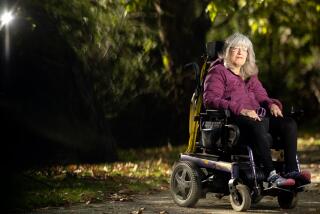HMO Slapped With $1-Million Judgment in Cancer Case : Health care: Panel denounces Health Net’s efforts to pressure doctor into reversing his support of treatment.
A three-member arbitration panel has slapped the state’s second-largest health maintenance organization with a $1-million judgment for improperly denying a breast-cancer patient a bone-marrow transplant and then pressuring her doctor to reverse his support of the treatment.
The latter action by Health Net, the arbitrators found, amounted to “extreme and outrageous behavior exceeding all bounds usually tolerated in a civilized society.”
At issue in the case was Health Net’s refusal in 1993 to pay for an advanced form of therapy to treat Christine deMeurers, a Health Net enrollee. DeMeurers was under treatment at the time by doctors at UCLA, which was not a party to the case.
DeMeurers, a Lake Elsinore teacher with two young children, died of breast cancer last March at the age of 34.
The ruling touched on several issues coming to the forefront of medical debate as HMOs and other managed-care plans take over a larger share of Americans’ health coverage.
Among them: How HMOs must interpret clauses excluding “experimental” therapies from their coverage; whether patients’ appeals of treatment denials should be ruled on by impartial parties, and whether there should be limits to an HMO’s contacts with an enrollee’s own doctor.
The arbitrators found in the family’s favor on all three issues. Because arbitrations are private, however, the ruling is not a binding precedent in any court.
The award is one of the highest against an HMO by an arbitration panel in a case involving denial of medical treatment. Some jury verdicts against HMOs, however, have been higher, including a $90-million verdict returned against Health Net by a Superior Court jury in Riverside County in 1993. That case also involved Health Net’s refusal to pay for the same breast cancer treatment denied deMeurers.
Health Net said through a spokesman that it is “extremely disappointed” and “strongly disagrees” with the ruling. The HMO also said it is considering appealing the award. The family’s lawyer, Mark Hiepler, however, said the award is unappealable unless Health Net can show it is the result of fraud.
“Given that Health Net chose the setting and chose the arbitrators,” he said, “it’s crying after spilled milk.” He called the $1-million award “a credit to the facts that were so compelling in the case.”
The deMeurers’ family contended that Health Net improperly refused to pay for a regimen of autologous bone-marrow transplant, or ABMT, that had been recommended by her doctors. In this costly treatment, a cancer patient is given high doses of chemotherapy; because the drugs kill bone marrow cells, a sample of the patient’s bone marrow is first extracted and stored to be re-transplanted later to aid the patient’s recovery.
Health Net denied the treatment on the grounds that it was “experimental or investigative,” and thus excluded from deMeurers’ coverage.
The arbitrators ruled, however, that ABMT is not experimental because it is being used increasingly in cancer cases with some clinical success. And the arbitrators found the term “investigative” too ambiguous to stand as the basis for Health Net’s denial of the treatment.
The arbitrators took special exception to what they considered Health Net’s “heavy-handed” interference with the relationship between the deMeurers and their doctor, UCLA oncologist John Glaspy.
Glaspy initially told deMeurers that patients in her condition had higher rates of recovery with ABMT than with standard-dose chemotherapy, Health Net’s preferred course. That therapy, Glaspy said, however, afforded his patient a “dismal chance of long-term survival.”
When the family sued Health Net in 1993 to force it to pay for the treatment, Glaspy provided the family with a sworn declaration in favor of the therapy. According to the arbitrators’ finding, Health Net Vice President Clifford Ossorio called Glaspy’s superior at UCLA to complain. The superior then held a “heated discussion” with Glaspy, and seven days after his first declaration in favor of the treatment, Glaspy gave a second one, reflecting for the first time “a negative tone as to the [ABMT] procedure,” the arbitrators ruled.
The arbitrators regarded Ossorio’s call as “designed and intended to interfere with an existing doctor-patient relationship . . . undertaken with reckless disregard of the probability of causing severe emotional distress.”
In fact, the family said, the HMO’s pressure on the doctors raised doubts over whether deMeurers would subsequently receive appropriate treatment from the UCLA team.
More to Read
Inside the business of entertainment
The Wide Shot brings you news, analysis and insights on everything from streaming wars to production — and what it all means for the future.
You may occasionally receive promotional content from the Los Angeles Times.










